by lauenc | Feb 5, 2024
Hunting, when approached responsibly, can be a rewarding and educational experience for young individuals. As a 4-H agent dedicated to fostering a love for the outdoors, I recognize the importance of instilling a strong foundation of ethics and safety when introducing youth to the world of hunting. To ensure a positive and educational introduction to this amazing tradition, several key considerations should be considered.
- Safety Training and Ethical Hunting Practices:
The Florida Fish and Wildlife Conservation Commission (FWC) offers comprehensive safety resources, emphasizing the importance of proper firearm handling, wildlife identification, and safe hunting practices. Educating young hunters about the critical role of safety protocols ensures a secure and enjoyable experience in the field. There are a variety of hunter safety courses available. Visit the Which Hunter Safety Course Is Right For You? | FWC (myfwc.com) webpage to find out what course to see what may work best for your family. If you have completed an online course and have a certificate, you can participate in the upcoming Field Day on November 18, 2023 at West Pittman Baptist Church in Holmes County. Visit the Hunter Safety Registration (site.com) webpage to register or find other courses in your area on a different date.
- First Shot Fundamentals:
Holmes County 4-H has been awarded several grants from the The National Rifle Association (NRA) Foundation. Our Holmes County 4-H Shooting Sports Program includes archery, rifle, and shotgun disciplines. Youth members learn “first shot fundamentals” that will translate to important life skills as they may choose to ultimately participate in hunting opportunities. Emphasizing the values of fair chase, respect for wildlife, and the importance of humane and responsible harvesting helps instill a deep appreciation for the natural world and ecosystem.
- Conservation Education:
Collaborating with 4-H programs that incorporate conservation education can help young hunters understand the vital role they play in wildlife conservation and habitat preservation. Teaching the principles of sustainable hunting and the importance of maintaining ecological balance contributes to the development of environmentally conscious and responsible hunters. This also includes ongoing education and research related to Chronic Wasting Disease (CWD) in Holmes County and the surrounding region to learn what we, as hunters, can do to help.
- Mentorship Programs:
The Florida Fish & Wildlife Conservation Commission often organizes mentorship programs that pair experienced hunters with newcomers. These programs, align with 4-H’s emphasis on positive youth development and foster a supportive learning environment. Mentors follow the guidance outlined in mentorship materials to provide hands-on training, impart valuable skills, and promote the development of strong ethical values in young hunters. Visit the Mentored Hunts Registration (site.com) webpage to find upcoming opportunities across the state of Florida.
- Legal Compliance and Regulations:
The Florida Fish and Wildlife Conservation Commission (FWC) provides up-to-date information on hunting regulations, licensing requirements, and seasonal restrictions. Educating youth about these regulations instills a sense of responsibility and legal compliance, contributing to the cultivation of law-abiding and conscientious hunters.
By integrating these considerations into the process of introducing youth to hunting, we can ensure that they develop not only a passion for the sport, but also a respect for wildlife and the natural world. Together, we can foster the next generation of responsible and ethical hunters who prioritize safety, conservation, and ethical hunting practices in their outdoor adventures. For more information about how your youth can get involved with Holmes County 4-H, visit the Holmes County 4-H (holmescounty4h.com) webpage.
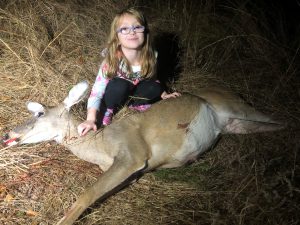
Miah, daughter of the Holmes 4-H Agent, enjoys the opportunity to harvest her first deer at age 6.
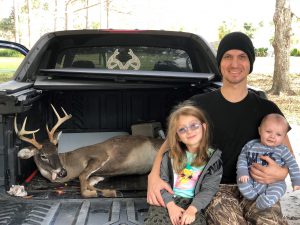
Holmes County 4-H Agent, Chris Lauen, introduces his children to a Holmes County whitetail buck.
by Niki Crawson | Apr 6, 2023
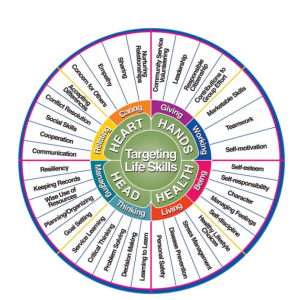
Figure 1. Hendricks, P. (1998) “Developing Youth Curriculum Using the Targeting Life Skills Model”
During the summertime, 4-H typically offers more opportunities for our teen audience since school is not in session as their schedules are more flexible. Because of this, we want to ensure that we are targeting skills that are specific to our teens’ immediate and future wellbeing and success.
In this article, I will discuss why life skills are so important, what 4-H programs already established target, which life skills are most beneficial for our teens and what, when, and how teens can get involved.
WHY DO WE CARE SO MUCH ABOUT LIFE SKILLS?
We know that life skills are abilities learned that help individuals reach their full potential in life. They assist in helping folks successfully handle day-to-day life experiences. We believe they are developed through hands-on learning, activities, and practice.
Life skills are the foundation of 4-H. Utilizing the Targeting Life Skills Wheel (Hendricks, 1998), we connect life skills through 4-H projects, programs, and events to real life experiences based on our Head, Heart, Hands and Health model. By helping youth achieve these life skills, 4-H professionals and volunteers are providing the framework for future academic and employment success, as well as youth thriving and community outreach.
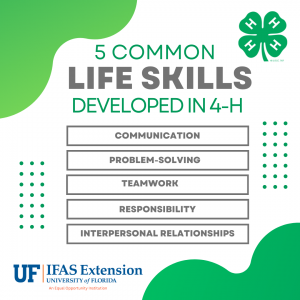
Five essential life skills from the Targeting Life Skills Model commonly developed by participating in 4-H are:
- Communication
- Problem-solving
- Teamwork
- Responsibility
- Interpersonal Relationships
PROJECTS & EVENTS RELATED TO LIFE SKILLS FOR TEENS
Below are just a few 4-H projects and events in Florida 4-H for teens to get involved in to develop and strengthen essential life skills:
- 4-H Tailgating Contest – This program teaches healthy living and the science of grilling seafood, pork, poultry and beef safely outdoors. This program teaches decision making, healthy lifestyle choices, and communication life skills, among others.
- Gator Pit – The Gator Pit is a program open to all teens ages 14-18 in Florida. Youth are taught how to develop entrepreneurial skills through mentorship, competition, and networking to the business community.
- 4-H Legislative – Florida 4-H Legislature provides an opportunity for teens ages 14-18 to experience state government procedures and prepare them for potential leadership in the American democratic process. Youth learn, practice, and defend public policy.
- 4-H University – Florida 4-H University is an opportunity for teens to participate in educational workshops lead by UF faculty, explore potential careers, strengthen interpersonal relationships with peers, and develop critical life skills that will help them become leaders and engaged citizens in their communities.
The Florida 4-H Curriculum Clearinghouse is a list of 4-H resources available, including project curriculum, record books, club resources and other educational publications that meet the standards of Florida 4-H. In this site you can view resources for specific projects. To learn more about 4-H opportunities for teens, please contact your local UF IFAS County Extension Office, or visit http://florida4h.org.
ADDITIONAL SOURCES:
Hendricks, P.A. (1998). Developing Youth Curriculum Using the Targeting Life Skills Model: Incorporating Developmentally Appropriate Learning Opportunities to Assess Impact of Life Skill Development. Iowa State Extension Publication. https://extension.purdue.edu/4-H/about/impact-targeting-life-skills.
Irvine, K. (2019). What are Life Skills? https://blogs.ifas.ufl.edu/nassauco/2019/02/04/what-are-life-skills/
by Marie Arick | Feb 24, 2023
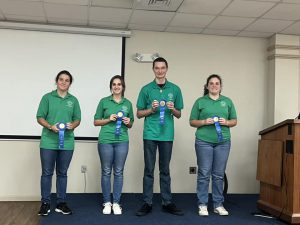
Escambia County’s 1st place Food Challenge Team
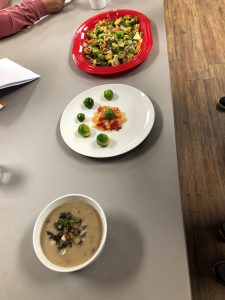
Judging table display of culinary creations. Top, Liberty’s, center Escambia’s intermediate, bottom Escambia’s senior.
The Northwest District 4-H Food Challenge took place on January 7, 2023, and the results were phenomenal! This new competition challenges youth to work as teams of no less than two or more than four, and practice critical thinking, open communication, and presentation skills. Presentations are to include the knowledge and skills youth have learned through the project such as kitchen safety, food safety, cooking techniques, recipe creation, and how they worked together. But that is not all, additionally, teams are using a set of specific cooking supplies, a mystery ingredient, a specific dish category (main dish, side dish, appetizer, or healthy dessert), and a set amount of 4-H money to spend at the challenge grocery store. The entire competition allows 40 minutes for youth to put all of this into practice. Escambia County entered a senior and intermediate team while Liberty County entered an intermediate team into the inaugural competition.
Escambia County’s senior team, dubbed O Crepe and the Spice Girls consisted of Alan Bray-Crews, Laney Clarke, Ryan Clarke, and Aubrie Dillon, who were presented with portabella mushrooms for their mystery ingredient with the category of the main dish. The team produced an excellent mushroom soup as their main dish. The dish along with their well-prepared presentation earned them a place in the Florida 4-H State Food Challenge competition at the Florida State Fair in Tampa on February 18.
The two intermediate teams’ mystery ingredient was Brussel sprouts and the side dish category. The Flaming Clovers of Escambia County consisted of Chloe Bray-Crews, Brian Brewster, Charli McClendon, and Kayla Weaver with alternate member Scott Weaver on hand. The Culinary Criminals represented Liberty County made up of Harper Holt, Jansen Capers, Isabella Ransom, and Lexi Ford. The two teams created uniquely different dishes and presentations. While the Escambia team received the first-place ribbon, Liberty County’s team came in a very close second place. Escambia’s intermediate team also earned a place at the Florida State Food Challenge competition at the Florida State Fair in Tampa!
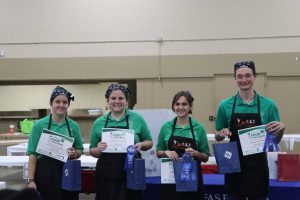
photo credit D. Clarke
O Crepe and the Spice Girls
With both Escambia teams representing the Northwest District at the state competition, it was exhilarating to watch the kids interact and quiz one another while awaiting the competition to begin. Seniors were given a red bell pepper as the mystery ingredient with the category of side dish and intermediates were given a tangerine for their mystery ingredient with the category of healthy dessert. Again, Escambia County dominated and secured first place in both age categories. The first-place senior team at the Florida State Fair, Escambia County’s O Crepe and the Spice Girls, is eligible to compete in the National 4-H Food Challenge at the State Fair of Texas in Dallas this fall.
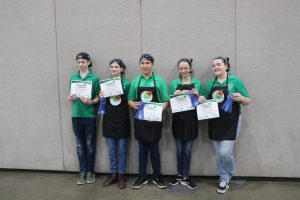
photo credit D. Clarke
Flaming Clovers
This new 4-H opportunity has been embraced in several counties thus far and will continue to grow. This project promotes practical life skills youth will use for the rest of their lives. If your child is interested in food and nutrition and/or healthy lifestyles projects, contact your local 4-H Agent to explore project opportunities.
A special thanks to Escambia County’s volunteer leader, Linda Crews, who has embraced this competition and has worked with these youth to truly make the best better, and to Mr. Dave Clarke for sharing state event photos.
For more information about the 4-H Food Challenge, visit our webpage. The 4-H Food Challenge would be a fun program for your next club meeting. Download the youth guide, team captain guide, and guide for hosting a food challenge.
by Claire Davis | May 6, 2022
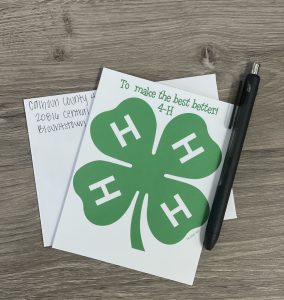 How do you know when it is appropriate to send a thank you card? Have you ever received a gift from someone? Did a volunteer donate their time for an event or for a club meeting? Are you in 4-H and someone purchased your project animal at auction? If you answered yes to any of these questions, then you should have written a thank you note to them! It does not just have to be a life changing event, such as a wedding, birthday, or baby shower, that warrants a thank you card. Whenever someone has done something nice for you, it is definitely worth sending them a thank you card.
How do you know when it is appropriate to send a thank you card? Have you ever received a gift from someone? Did a volunteer donate their time for an event or for a club meeting? Are you in 4-H and someone purchased your project animal at auction? If you answered yes to any of these questions, then you should have written a thank you note to them! It does not just have to be a life changing event, such as a wedding, birthday, or baby shower, that warrants a thank you card. Whenever someone has done something nice for you, it is definitely worth sending them a thank you card.
Writing thank you notes is a skill that many people should have, but many overlook. What exactly do you need to say in your thank you note? Here is an easy guide for a few things that you should include in your thank you note, regardless of the reason you are writing it!
Make sure that you start off by thinking of why you are writing a thank you note! Thank you notes let the individuals know that you care, that you are proud of your accomplishments, or make them feel appreciated for something that they have done for you!
-

A decorated academic cap at commencement. Photo taken 04-29-17.
Make the letter personal by starting with a salutation. Address the individual(s) by their name. If it is someone that you are well acquainted with, it is alright for you to address them by their first name. If it is someone that you are not as familiar with, stick to Mr., Mrs., Ms, and/or Miss last name. Below are a few examples of how to address someone:
Dear Aunt Renae,
Dear Lilly,
Dear Mr. and Mrs. Leonard,
- Get right to the point and express your gratitude. Some examples could be:
“Thank you so much for your generous wedding gift.”
“Thank you for the birthday present.”
“Thank you for donating your time at the Horse Club Meeting.”
“Thank you for purchasing my steer at the Calhoun County Livestock Show.”
- Maybe mention a specific detail or two. There is no need to exaggerate about their gift, but tell them what it might be used for or what you appreciate about it. Here are a few examples of things to say.
“I am so excited to get to use the birthday money on my upcoming trip to Disney World.”
“I’ve had my eye on a smoothie maker, and now I am a smoothie making machine!”
“We are saving the wedding money to help build our future home together.”
“The knowledge you shared at the meeting is incredibly valuable and the kids were soaking it up!”
“I am going to save the money from my 4-H steer project in my college fund.”
- Look ahead to the future. You may be excited about your trip to Disney World or the new smoothie machine, but make sure they know that you appreciate them or enjoyed working with them. If you are likely to spend time with them again in the future, this is a good way to move your letter towards wrapping up.***This suggestion may not apply to every letter.
“I can’t wait to have dinner with you again.”
“I’ll be up that way here in a few months and would love to see you.”
“I am interested in the position and look forward to hearing from you soon.”
“We cannot wait to have you teach us again at the club meeting next month.”
- Wrap it up with another thank you and sign off. Make sure that your letter is clear, you want to thank them for their time, donation, money, etc. You do not have to use fancy language to end your letter.
“Thank you again for thinking of us on our special day!”
“Thank you for being so generous to our organization.”
“Again, thank you for spending your time with us.”

Albert the Alligator Florida Gator mascot holding a thank you sign. Photo taken 11-16-16.
Make sure to end your letter appropriately, whether that be professionally or casually.
“Warmly,”
“With love,”
“Sincerely,”
When in doubt, write a thank you card. Your recipient will feel extra special that you want to show them your gratitude!
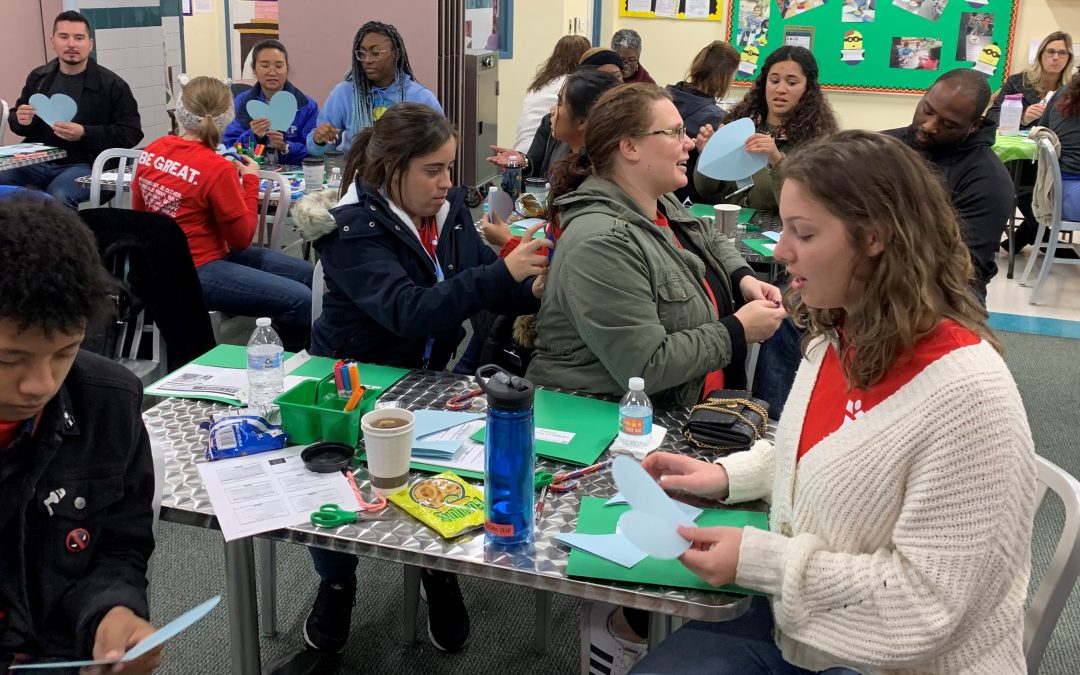
by pmdavis | Mar 6, 2020

4-H Volunteer Training about healthy relationships!
Make 2020 the year you learn something new or share your talents with a young person in your community. 4-H, the nation’s largest youth development and empowerment organization, cultivates confident youth who tackle the issues that matter most in their communities. It allows youth to learn by doing. 4-H relies on screened, dedicated volunteers to promote its mission to help youth gain the knowledge and life skills they need to be productive, responsible citizens.
In the Florida Panhandle, we have 4-H programs in schools, afterschool settings, and on military bases where we provide curricula and training to enhance our youth experiences while being active in 4-H. We also have school enrichment programs offering youth 4-H experiences on a specific subject while in school. We have community clubs and special interest groups that are currently active and we need more caring compassionate adults to help! These opportunities are great for families to do together.
If you only have time for a short-term event and like sewing, grilling, cake decorating, gardening or love bugs and outdoor education, consider volunteering. Contact your local Extension Office to see what spring and summer workshops and day camps are being offered that need caring adults to act in the role of 4-H volunteers. Your time as a volunteer will provide our youth the safe place to pursue whatever interests, causes, and leadership roles are most important to them. It also allows you to learn from the youth about current trends, fashions and technology. It really is a two-way learning opportunity where all involved learn by doing.
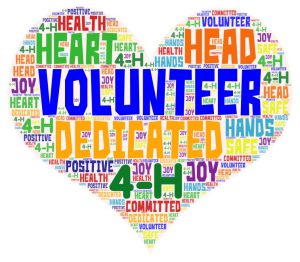
To volunteer, even for the summer workshops, you will need to be screened and trained, so contact us now. The screening and training process takes a little time. Please considervolunteering in your community. With over 70 different 4-H project areas from money and finances, gardening to computer science and rocketry, there are plenty of areas to work with youth to share your knowledge and skills. Please consider helping us live up to our motto of “making the best better” with 4-H by volunteering today. Simply contact your local extension office or check out our website for more information.














